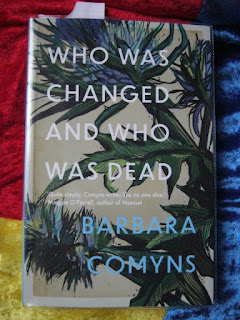Here is the grandmother, plotting, but confined by the fact that she has vowed never again to set foot on land she does not own, so she has to take her enjoyment in the situation as best she can:
"The old lady picked some beeswax out of her teeth as she pondered ways of putting her son in his place and brightened up a little when she decided to put the maids on to spring-cleaning his room. He couldn't sit up there in haughty isolation under those conditions. She chuckled to herself and felt happier. But if only she had been free to wander in the village and hear the screams coming out of cottage windows and perhaps even help nurse one of the unfortunate afflicted. She would dearly love to see someone who believed they were being pursued by monsters. So far there had only been five cases, but there would be more; she was confident there would be more. One of the maids might become a victim, or even Old Ives. The thought of Old Ives being devoured by imaginary monsters cheered her up considerably, and she trotted off to the potting shed to see if he looked at all queer; but she found him looking very well, sorting out some seeds he had been drying. She wasn't very pleased with the way he looked at her and asked how she was feeling." (p.87-88)
The other library book is '100 Prized Poems - Twenty-five years of the Forward Books', a celebration of works that have been published by Forward and won their poetry prizes. (If you have a few minutes, go and read this, (explanation here of what the poet, Nicole Sealey is writing about) the winner last year of the single poem prize). It has been some bedtime reading over the last few weeks, with many surprises and thought provoking moments, a few familiar names too. I give you this, War Poetry by Kate Clanchy. I loved the description of the broken nest, but also it feels somehow appropriate to the current world situation:
The class has dropped its books. The janitor's
disturbed some wasps, broomed the nest
straight off the roof. It lies outside, exotic
as a fallen planet, a burst city of the poor;
its newsprint halls, its ashen, tiny rooms
all open to the air. The insects' buzz
is low-key as a smart machine. They group,
regroup, in stacks and coils, advance
and cross like pulsing points on radar screens.
And though the boys have shaven heads
and football strips, and would, they swear,
enlist at once, given half a chance,
march down Owen's darkening lanes
to join the lads and stuff the Boche -
they don't rush out to pike the nest,
or lap the yard with grapeshot faces.
They watch the wasps through glass,
silently, abashed, the way we all watch war.
Stay safe. Be kind.


No comments:
Post a Comment
Thanks for stopping by. Thoughts, opinions and suggestions (reading or otherwise) always most welcome.